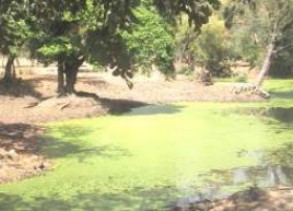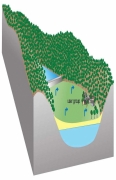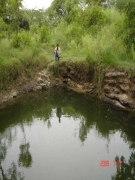/topics/society-culture-religion-and-history
Society, Culture, Religion and History
Restoration of traditional small water bodies in Braj - The South Asian Journal of Tourism and Heritage
Posted on 01 Sep, 2010 02:28 PM This paper published in the South Asian Journal of Tourism and Heritage begins by highlighting the importance of the traditional small water bodies in Braj, commonly known as kunds, as important freshwater sources as well as an important part of the culture and the traditions of the area.
This paper published in the South Asian Journal of Tourism and Heritage begins by highlighting the importance of the traditional small water bodies in Braj, commonly known as kunds, as important freshwater sources as well as an important part of the culture and the traditions of the area.
There were 1000 such kunds, which used to be the source of fresh water in Braj in earlier times. The water was used for multiple purposes like irrigated agriculture, domestic uses, drinking water for cattle, bathing etc. Due to rapid urbanisation, lack of maintenance and prolonged negligence in the last 50-100 years, most of the kunds today have become silted up and are nearing extinction.
The impending crisis for fresh water has forced the planners and policy makers to take cognizance of these traditional water bodies and an urgent need has been identified for taking necessary measures to restore the kunds. The present study thus aims at understanding the reasons for deterioration of the kunds and makes some technical suggestions for revival of these kunds.
Babhli water conflict: Less water, more politics - EPW article
Posted on 01 Sep, 2010 02:13 PMThis paper published in the Economic and Political Weekly highlights the recently growing conflicts over water sharing between states in India and argues that the intensity and periodicity of these conflicts are increasing and that these conflicts are expected to get worse with the increasing uncertainty of rainfall and water availability. The document goes on to describe the latest one in the news, the conflict between Maharashtra and Andhra Pradesh over the Babhli barrage.
The indigenous struggle- A look at three South American films on water rights
Posted on 31 Aug, 2010 02:51 PMThis past weekend was the only international film festival on water, worldwide—Voices from the Water, held in Bangalore in several different locations. Working for a water NGO, I made my schedule free to catch up on some of these movies, to understand what the current issues are and what the film circle is capturing through their lens that we don’t necessarily see from our biased eyes.
Movie reviews from 'Voices from the Waters 2010' film festival held in Bangalore
Posted on 28 Aug, 2010 08:58 AM
Reviews of some of the movies screened -
“Be water, My friend”
This UNESCO funded film, “Be water, My friend” tracks the research of Professor Gordon Lightgoot, an expert on ancient water monuments as he tries to understand and rectify the alarming drying up of Karez’s in northern Iragi region of Kurdistan.
Community organisation in groundwater management – A presentation by ACWADAM
Posted on 27 Aug, 2010 04:01 PM This presentation by ACWADAM on community organization in groundwater management deals with the processes involved in people’s mobilization and participation. The requisites of groundwater management include: resource enhancement, demand management, equitable distribution, institutional mechanism and controlling of free riding. It deals with groundwater management at a local scale when compared to aquifer management.
This presentation by ACWADAM on community organization in groundwater management deals with the processes involved in people’s mobilization and participation. The requisites of groundwater management include: resource enhancement, demand management, equitable distribution, institutional mechanism and controlling of free riding. It deals with groundwater management at a local scale when compared to aquifer management.
Aquifer management involves:
- Identification of aquifer on the basis of geology;
- Identification of recharge and discharge areas;
- Assessment of aquifer capacity and yield through aquifer mapping;
- Protection of recharge area and increasing the groundwater level through artificial recharge in recharge area (based on the geology);
- Treating groundwater as a common property resource;
- Encouraging community use of groundwater and restricting individual use;
- Putting in place an institutional mechanism and legal back up for community groundwater management;
- Awareness generation regarding groundwater and science of hydrogeology.
Pani Panchayat: A model of groundwater management – A presentation by ACWADAM
Posted on 25 Aug, 2010 08:20 AM The presentation by ACWADAM deals with Pani Panchayats as a model of groundwater management.
The presentation by ACWADAM deals with Pani Panchayats as a model of groundwater management.
Pani Panchayat is the name first given to a movement by Mr. Vilasrao Salunke for motivating farmers of Naigaon village of the drought-prone Purandhar taluka of Maharashtra in 1974. The government's inability to deal with the drought situation prompted him to take a 40 acre land on lease from the village temple trust and develop a recharge pond in the recharge area of the village, a dug well in the discharge zone and a lift irrigation system.
Farmers got impressed with the results demanding a scale up of the experiment leading to the setting up of Gram Gaurav Pratisthan (GGP) through which the work was expanded to encompass both groundwater and surface water management.
Emerging groundwater crisis in urban areas – A case study of Bangalore city
Posted on 16 Aug, 2010 07:14 AMThe paper by the Institute for Social and Economic Change documents the case of Ward No. 39 situated at the outskirts of the Bangalore city to understand the emerging groundwater crisis due to overdraft in urban areas. Bangalore has no perennial river, which resulted in the growth of many lakes, acting as a source of groundwater recharge earlier.
Voices from the Waters 2010 : The 5th international film festival on Water
Posted on 12 Aug, 2010 05:25 PMPower finance: Financial institutions in India's hydropower sector - A report by SANDRP, Urgewald and IRN
Posted on 12 Aug, 2010 05:01 PMThis report published by SANDRP, Urgewald and International Rivers Network (IRN) provides a brief background on India's power and financial sectors and illustrates the issues at stake by giving examples of two important power projects in India, the Dabhol project and the Maheshwar project.
The next part of the report describes the role that the domestic and international financial institutions have played and continue to play and the controversies that have been associated with the functioning of these institutions in the implementation of the hydropower projects in India.
The report emphasises the importance of the role of NGOs and civil society movements in making these institutions accountable to the common people whose lives are affected by the projects/ interventions.
Mountains of concrete: Dam building in the Himalayas - A report by International Rivers Network
Posted on 11 Aug, 2010 07:38 PMThis document by International Rivers Network provides a background for the recent plans initiated by India, Nepal, Pakistan and Bhutan to build several hundred dams on the Himalayan mountains, which store vast amounts of water and with their high slopes and fast moving rivers, present a huge potential for generating hydropower.
India, Nepal, Pakistan and Bhutan have been facing the increasing challenges of meeting their rising elecricity and energy needs and hydropower dams in the Himalayas are being proposed as solutions to meet a considerable part of these requirements.
The document examines the various arguments that have been put forward against the building of the dams as against the proposed advantages that the dams are claimed to have for these four countries, which share common geographical, topographical and eco-climatic features but have starkly different political and economic contexts.





